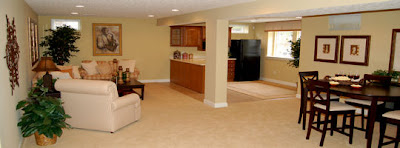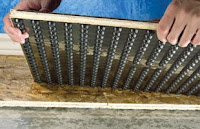Basement Flooring Options


Basements present some flooring challenges that are unique with respect to home construction. Whether your basement is fairly new or old the issues remain the same. Concrete basements by nature are a very damp environment. Concrete typically has a moisture content of between 2% and 8%. Moisture contents like that can really cause problems to flooring systems. You should test your concrete slabs moisture content before you start your flooring project. Most manufacturers require moisture contents below 4% to 5%.
The other big issue with basements is flooding. Many homes are threatened by the occasional spring flooding of basements. If your basement has a history of flooding it’s really best to solve that problem before spending money on remodeling your basement. There really are very few options for flooring that will withstand flooding. Not only that, but even if you find a flooring that won’t be bothered by the flooding the walls are still a problem.
So assuming you’ve got your moisture content under control and no flooding problems that you’re aware of the next step is figuring out what type of flooring you want. There are really three categories to choose from:
- Tile – In my opinion ceramic or porcelain tile is the best option for a basement. I’d install a layer of Ditra underlayment followed by the tile on a bed of thin set. Both of these products won’t be affected by the moisture and quite possible whether a flooding event unscathed. Installing tile is a great DIY project that anyone with moderate skills can do.
- Wood – There are engineered wood products on the market that are ac


- Carpet – I’d only use carpet in a basement that has a history of being dry. I would make sure that you do this one of two ways. Either it’s a carpet specifically made to glue down to concrete or you install a sub-floor like the one mentioned above. Mold problems in this country are at an all time high and one of the big culprits are finished basements. Carpet can easily get wet and promote mold growth so make sure you evaluate this choice properly before you begin.
My biggest piece of advice is be honest with yourself. Don’t pretend that your basement is dry if in fact it’s not. Too many people assume that the past flood won’t happen again because it was a fluke or it was a 100 yr flood so that can’t happen again. Don’t waste your money if you have a wet basement. Use the money to fix the water problem before you spend it on finishes. Make sure your flooring contractor or supplier know the exact application. Lastly take your time making a decision, too often people just look at price with flooring and they are unsatisfied later.
Recent Posts
Framing Stick Nailer vs Coil Nailer
Which is Better a Stick Nailer or Coil Nailer? Framers have many choices in nailers…
How Many Roofing Nails Per Square of Shingles
Estimating How Many Nails for a New Roof When it comes to estimating materials for…
Composite / PVC Decking – Layout Tips & Advice
Composite / PVC Decking Layout Tips and Advice Composite and PVC decking have really changed…
Benefits of an ERV System (Energy Recovery Ventilator)
Benefits of ERV Systems (Energy Recovery Ventilator) If you're building a new home or doing…
Vermiculite Attic Insulation Abatement
Vermiculite Attic Insulation If your home was built before 1990 there is a chance it…
Nuisance Tripping of AFCI (Arc Fault) Circuit Breakers
Arc Fault (AFCI) Circuit Breakers Tripping Often An arc-fault circuit interrupter (AFCI) or arc-fault detection…
View Comments
I am forwarding the tile idea to my folks, who have had the "opportunity" to replace their basement carpeting a couple of times in recent years thanks to heavy rains. How great it would be not to have soggy carpet to deal with... I'm not sure the idea of tile really even crossed their minds. "Finished basement" seems synonymous with "carpeted basement" around here. I think tile would actually be even more attractive. Good ideas, good post.
I live in the Kansas City Metro. A lot of basement get wet around here mainly in the older homes, but it does happen in the newer homes. The trend here is to acid stain, or uses dies on basement floors. Then throw rugs in certain siting areas. You never have to worry about water and it's easy to clean. There are a lot of options in colors, and it looks very classes. It is cheap to have done, and with a little homework you can do it yourself, but do your homework. Depending on the moisture content of the concrete you needed to be selective on what type of seal you use, and what time of year you do the project. Don't do it during the rainy season, but the dry season preparing for the next rainy season. Some people will say to use clear epoxies over it, don't do it, you could run into some big problems. Do some searches on google for "acid stained concrete" and "concrete dye's"
take care
After our recent shopping for kid and pet-resistant flooring options... We discovered that carpet tile is an excellent option for folks who want to carpet a basement without having to deal with a huge sopping mess of wet carpet in the event of water problems down there. The wet tiles can be pulled back out - cleaned and dried... in sections! And it looks cool too - tile plus carpet. Neato.
We've already gotten to test out the carpet tiles we laid in our son's bedroom last weekend... Seems our poor dog was ignored when asking to go out (Oof!) and found the only patch of carpet in the house (closer to grass, I suppose?) -- the new carpet tile!! We pulled up the three involved tiles and washed them out with a mild detergent.. let them dry (they dried FAST) and popped them back in place. Nice stuff.
I'm the one who requested this subject. Thank you for your quick response!!
I'm also more towards Tile. Even though our basement is pretty dry, we had a bit of water steeped in last winter due to heavy rain for a week. I thought about engineered wood floor option, but customer support for the product said it's not even recommended for bathroom...;(
I wonder if Ditra would also help as a bit as cushion between concrete floor and tile?? It gets cold there in winter, but not worth for us to install radiant heat because we won't use the area daily (too long/costly to warm up for small use).
I have Ditra under two floors with ceramic tile and radiant heat. However, both are on a wood sub-floor. Ditra may provide a bit of a "cushion" of sorts because the honeycomb like product leaves some voids. Interesting thought....
There are some new basement flooring alternatives available, specifically developed to be used in basements, because they are 100% waterproof and inorganic to prevent mold growth.
They are "all-in-one" floating interlocking flooring systems, raised from the concrete slab as to keep the finished surface away from the cold damp concrete slab and serve as a thermal/vapor barrier.
http://knol.google.com/k/cynthia-freeney/new-basement-flooring-options/2zysz04ujf01c/2#